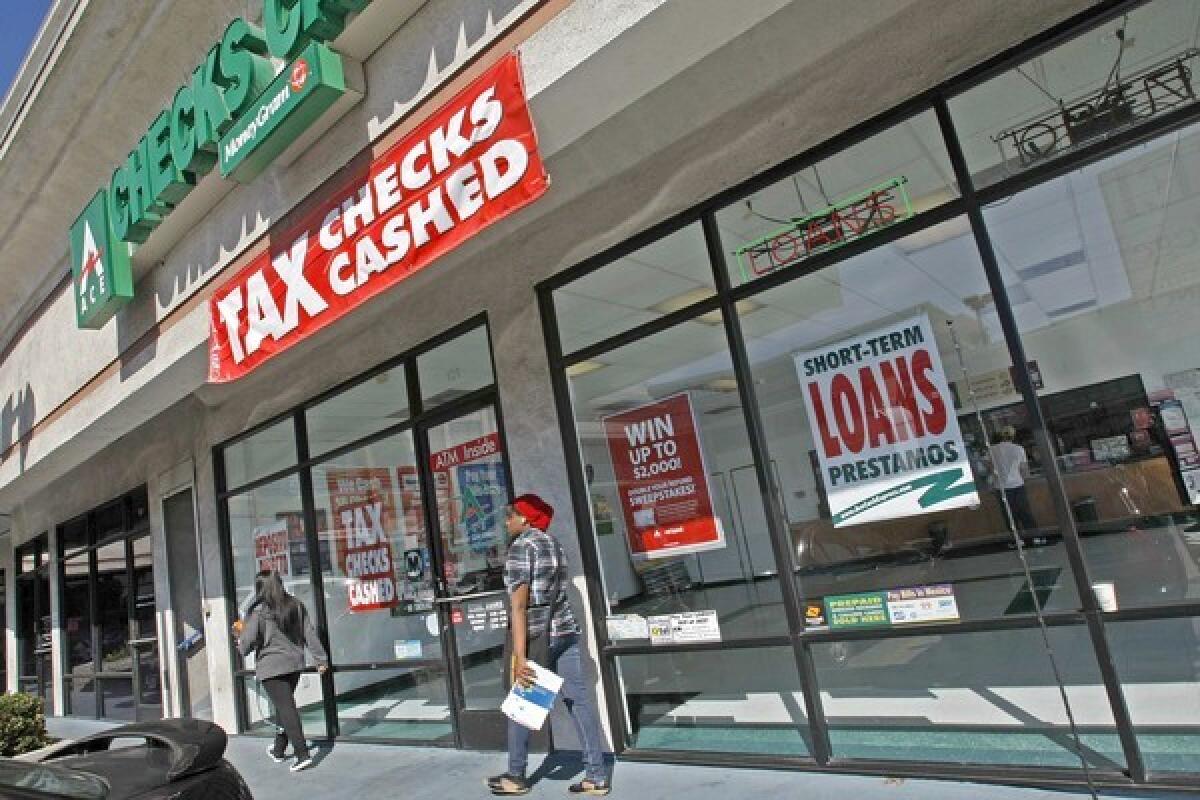Editorial: California needs its own Consumer Financial Protection Bureau

- Share via
No time is a good time for financial fraud and abuse, but consumers are particularly vulnerable when the economy is sagging, money is tight and jobs are scarce. Like, say, now. That’s why it’s particularly important to transform the state Department of Business Oversight this year into a more powerful guardian against illegal, deceptive and unscrupulous practices by companies that provide financial services to consumers, as Gov. Gavin Newsom has proposed.
The idea is to create a state version of the federal Consumer Financial Protection Bureau, which Congress established in 2010 to help curb the predatory lending practices that contributed to the Great Recession. The bureau is only as useful as its leaders allow it to be, and the directors appointed by the Trump administration have shown more concern about the well-being of the companies they oversee than the consumers they’re supposed to protect.
Following the departure of its initial director, Richard Cordray, in late 2017, the bureau has slashed its enforcement actions, slammed the brakes on rules to protect consumers against predatory payday and auto title loans, and stopped collecting data from mortgage lenders that could expose discriminatory practices.
California law already bars financial services (and every other business) from engaging in unfair and deceptive practices. And the Department of Business Oversight already brings enforcement actions against lenders, loan servicing companies, investment advisors and others offering financial products to Californians.
But the department can license and regulate only those categories of businesses within its statutory purview. Some financial services are regulated by other state agencies, such as the Bureau of Real Estate Appraisers and the Department of Insurance. And thanks to the magic of the internet, there is a steady stream of financial service companies popping up that don’t fall under any agency’s jurisdiction. “Whether that’s a new breed of debt buyers or a new class of credit repair organization, there’s no end to the type of creative financial services outfit that can emerge,” said Manuel P. Alvarez, the Department of Business Oversight’s commissioner.
Newsom’s proposal would smooth out the patchwork and plug the gaps by giving the department the authority to identify and stop unfair, deceptive or abusive practices by anyone offering financial products or services in the state. That will not only protect more consumers, but also level the playing field between regulated and unregulated businesses. It’s hard to be a good corporate citizen when you’re competing with companies that can flout the rules.
A second problem is the shortage of cops on the beat. Even if you exclude the loans and credit lines extended by banks, which are regulated by federal agencies, the scale of the financial services provided in this state is staggering. Non-bank lenders made nearly $350 billion in loans to Californians in 2017. According to the department’s most recent annual report, the payday loan business alone had 182 licensed companies in the state operating 1,645 stores. No wonder it seems like there’s a payday lender on every corner in some neighborhoods.
The governor’s plan would add 90 employees to the department over the next three years, an increase of about 15%, and would cost an increasing amount annually — $19.3 million in the fiscal year that starts in July 2022. Some of those resources would be dedicated to educating consumers and promoting innovation in financial services, but much of the increase would go toward enforcement. Notably, the money for the expansion would come from the additional registration fees and penalties the department would collect from financial services companies; Alvarez said the department already has enough funding in reserve to cover the first three years’ costs.
Newsom laid out the proposal in January, in his first budget proposal for fiscal 2020-21. Nevertheless, some lawmakers are complaining that they need more time to vet the expansion. A group of 26 Assembly members have asked that the plan be deferred for a year so that hearings could be held. None of them, though, are on the committee that oversees financial services, whose chair, Monique Limón (D-Santa Barbara), is a leading proponent of the plan.
The request feels more like a stalling tactic than a legitimate effort to improve on the idea. And with the Consumer Financial Protection Bureau effectively sidelined, a year’s delay is simply too long. When the economy is tanking and a financial crisis is taking hold, Alvarez said, some lenders, credit-repair companies and other financial services companies go into overdrive “to try to capitalize on the last few dollars in a consumer’s pocket.” The state should work just as aggressively to keep those dollars from being siphoned away.
More to Read
A cure for the common opinion
Get thought-provoking perspectives with our weekly newsletter.
You may occasionally receive promotional content from the Los Angeles Times.










